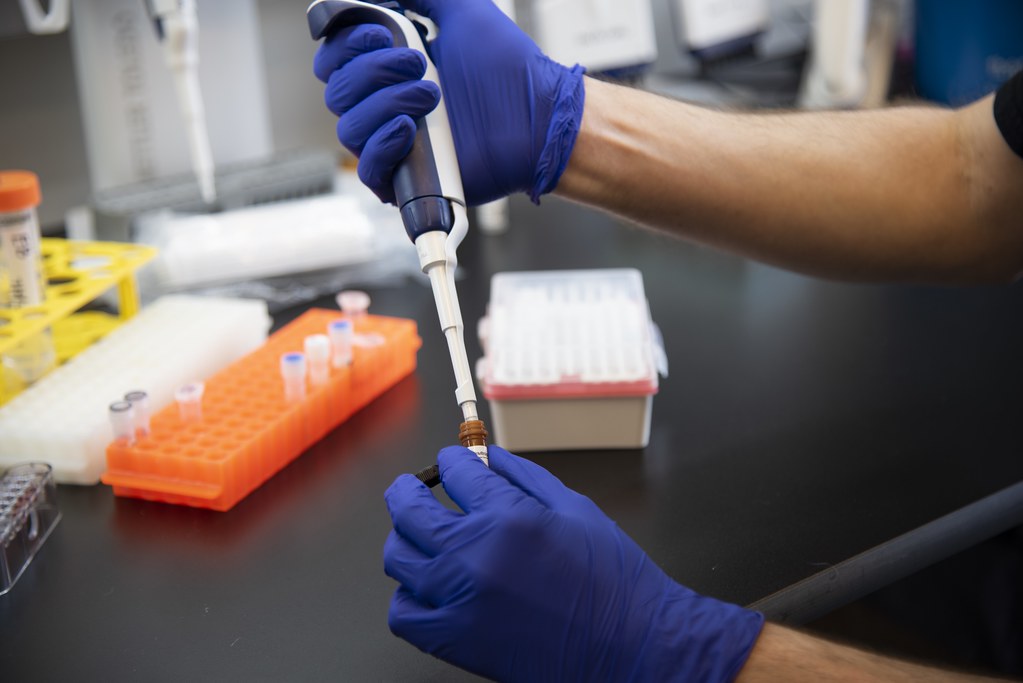Thousands of cells are made into gel-emulsified droplets and are quickly surrounded in a bed of oil — all in a day’s work for Grant Zane.
Grant Zane is a research specialist lead at the University of Missouri Genomics Technology Core in Bond LSC where he performs these types of experiments and more.
“What made research really fun is essentially not knowing and then being the first one who gets to figure it out,” Zane said. “There’s a question that’s not yet answered.”
From researchers on campus to scientists around the country, the Genomics Technology Core provides labs and businesses with DNA sequencing services like this one. The procedures are set for each group of samples they receive based on the needs of that lab or business.
Cancer, stomach, and heart cells are just a few of the many different samples received each day. The cells are often placed into an instrument that isolates them in order to amplify the amount of DNA in the sample and prepare for it to be sequenced and analyzed.

This is one of various processes the Genomics Technology Core performs in order to report the data back to researchers for them to use in identifying how a population of cells reacts to factors such as a vaccine, an antibiotic, or other treatment drugs.
Zane got into this type of work by first developing his knowledge in the field of mathematics.
“Math was my strongest field. Science was not as strong, but it was a challenge, so I enjoyed there being a challenge,” Zane said.
With that challenge came a resilient nature in Zane to overcome the obstacles that come with experiments and the problem-solving skills utilized in the process. He has been working at the University of Missouri since 2002, when he moved here from California.
Zane enjoyed the peaceful environment of Columbia, and how it was a less hectic town, something he craved after the busyness of Southern California.
Outside of the lab Zane spends time with his wife and four kids. He also enjoys activities that teach him new things such as podcasts.
One podcast at a time, Zane continues to enhance his understanding of various subjects — everything from the inner workings of cybersecurity to historical facts and figures — his favorite podcast being “Revisionist History.” He brings the understanding of science that he has into these hobbies as well, and aspires to one day create a podcast where he analyzes how and why Nobel Prize winners are chosen, and the science behind the process.
“I like learning about how people think and their modes of thinking,” Zane said.
Zane’s appetite to learn helps him enjoy the research he does each day and appreciate how it impacts the lives of many scientists and researchers.
“You get to try to solve that puzzle, and sometimes there’s new tools that have just been introduced that weren’t available before,” Zane said. “So, they didn’t know the answer and now you have that accessible, which makes me feel good to be able to help other scientists.”

Zane earned his bachelor’s degree at California State Polytechnic State University in San Lu Obispo, California, and his master’s at the University of California, Riverside, both in microbiology. After that, he worked as a research specialist for Judy Wall, an MU distinguished professor of biochemistry, for 17 years, and then moved to another lab to work with Michael Chapman, an MU professor and chair of biochemistry, for two and a half years.
The opportunity for an increased balance between his work in the lab and his life outside of it became a motivating factor in him taking the position at Bond LSC.
When working on cell cultures, which need to be grown and harvested in a three-to-five-day period and placed in fresh cells routinely, Zane found himself constantly choosing between his work and his family life.
“That type of work could take a long time and it was very frustrating,” Zane said “Now, there’s nothing to worry about here or anything that will move on without me physically there.”
His samples now are stashed in the freezer at minus 20 degrees and time works its magic. This type of system was not part of Zane’s everyday life before he started at Bond LSC.
“It’s like, you can’t just go to work every day and put your cat in the fridge. That just doesn’t work,” Zane said. “I was still thinking a lot on work while I was at home, but now I don’t have to worry about it, and I am more present now.”
Zane enjoys the new routine that he has developed alongside the ability to check off tasks and feel accomplished.
“The point that is most fulfilling about this work is that you know you are helping the researcher with the questions that they are trying to answer,” Zane said. “It’s moving along science in that sense, and moving someone else’s project along that keeps me motivated.”


